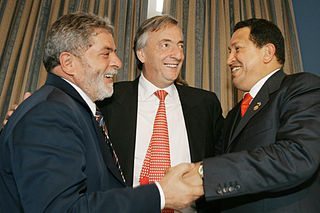Hugo Chavez is very sick and probably dying. That’s going to likely create a constitutional crisis in the strongman’s Venezuela, as his ruling party tries to fend off calls for a new presidential election if he can’t make it to his own swearing-in.
What’s most interesting to me is the extremity of Venezuela’s economic problems, which are crippling. As detailed by a former Venezuelan trade and industry minister in the New York Times today, the country is economically collapsing, even amidst a profound, long-term commodity boom that should be making the oil-rich nation rich. It’s possible for us to take the booming gains from commodity booms for granted. After all, how could a resource-producing nation like Canada fail to get rich in a time of plus$100 oil, high-priced potash, and of course $13 canola and $9 wheat? Well, Venezuela proves that it is possible.
“President Chavez has bequeathed the nation an economic crisis of historical proportions,” says Moises Naim in the NYT piece.
Naim is no ideological friend of Chavez, so he’s unlikely to be singing his praises, but little he says about the situation can be challenged. The country is broke, seems to be falling apart, is sucking in more and more imports to fill in gaps appearing as the domestic economy crumbles, and is even importing gasoline because its main refinery producer is broken. Remember when Chavez dramatically offered subsidized Venezuelan gasoline to poor folks in Boston and other U.S. centres? Rather the reverse now.
Chavez’s Venezuela is a beautiful example of crude socialism done wrong. In the middle of a commodity boom, he bankrupts his nation. Fortunately for his historical reputation, he’ll likely die before the collapse comes, so he won’t be listed as the guy who presided over a disaster and was then replaced by political opponents. That’ll be the next guy, or gal.
Read Also

Higher farmland taxes for investors could solve two problems
The highest education and health care land tax would be for landlords, including investment companies, with no family ties to the land.
Brazil’s Lula, a moderate socialist, achieved the opposite when he was in power. In a commodity boom like we’re living through, places like Canada and Brazil – and Venezuela and Argentina – should get rich. Canada, at least the Western half of it, is getting rich. Brazil has done much, much better than Canada, massively expanding many of its resource and industrial sectors as the boom has brought opportunity and money flowing into the country. In 2003 – 10 years ago – I went to Brazil to tour the expansion of soybean production in the massive Mato Grosso region. At the time the prospect of Brazil producing 60 million tonnes of soybeans per year seemed possible, but was something scarcely conceivable five years before. Yesterday I was reading a few estimates of this year’s Brazilian soybean production being possibly 83 million tonnes. Wow! And the country has many more resources that it is pouring onto the world market at today’s high prices, and much of that money gets recycled inside Brazil in new industrial investment. It’s a virtuous circle.
That doesn’t happen when a government runs amok. It’s to Lula’s credit that he managed to bring more social fairness and spread opportunities wider than was possible in the deeply-divided society before his time, and he did it without pillaging the productive economy. When I was in Brazil, I was impressed by the way the established farmers – often the richest people in the area – were pro-Lula and kept saying the country needed to spread the wealth wider and narrow the appalling gaps, but needed to do it in a way that would allow them to expand production so there would be more wealth to spread around. So far, that’s what seems to have happened.
Chavez took a more revolutionary approach and started a form of non-violent civil war against the privileged and business classes. He looted the nation’s private assets, chucked lots of the proceeds at the poor, and made himself into a hero. That approach has worked, but when there’s nothing else to loot, the masses won’t be so easy to please. Venezuela also probably won’t be able to prop up Cuba any longer with its shipments of bartered oil.
Chavez proclaimed his championship of the “Bolivarian Revolution” – named after 19th century Venezuelan revolutionary Simon Bolivar – and took the original motto of “Motherland, socialism or death” when he took over. Later that motto was changed to “Socialist motherland and victory, we will live and we will come out victorious.” Little of that seems true now.
The Bolivarian revolution isn’t restricted to Venezuela, with similar governments at work in Bolivia and Ecuador, and Argentina practicing its own historically unique form of right-left populism. Perhaps the middle two will be able to practice Bolviarianism a bit more competently than Chavez. Venezuela isn’t alone in throwing away this present commodity boom, which is likely entering its later stages. Just look at Iran: oil-rich and dirt poor.
But it’s an interesting question to me: Which will die first, the Bolivarian revolution or the long term commodity boom? With the commodity boom having maybe three to five years left, it’s hard to call.
















